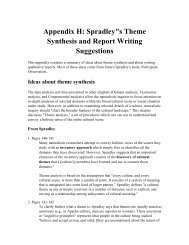Guidelines for Finding a Legitimate Problem
Guidelines for Finding a Legitimate Problem
Guidelines for Finding a Legitimate Problem
Create successful ePaper yourself
Turn your PDF publications into a flip-book with our unique Google optimized e-Paper software.
EDU-5990 – Note Slides from Dr. Dunlop 1<br />
<strong>Guidelines</strong> <strong>for</strong> <strong>Finding</strong> a <strong>Legitimate</strong> <strong>Problem</strong><br />
1. State the problem<br />
2. Think through the feasibility of the project that the problem implies<br />
3. Say precisely what you mean<br />
4. Edit your work<br />
Every problem Needs Further Delineation<br />
1. Stating the hypothesis and or research questions<br />
2. Delimiting the research<br />
3. Definitions – not ficacta from Webster, obtain either theoretical or operational<br />
definitions from the major theorist<br />
4. State the assumptions<br />
Characters of Sub-<strong>Problem</strong>s<br />
1. Each sub-problem should be a completely researchable unit.<br />
2. Each sub-problem must be clearly tied to the interpretation of the data.<br />
3. The sub-problem must add up to the totality of the problem.<br />
4. Sub-problems should be small in units.<br />
Eight Steps in Fine Tuning Your Research <strong>Problem</strong><br />
1. Complete the necessary background search<br />
2. Try to see the problem from all sides<br />
3. Think through the process<br />
4. Use all available tools and resources at your disposal<br />
5. Discuss your research problem with others, especially with your peers.<br />
6. Hold up project <strong>for</strong> others to examine and comment on<br />
7. Actively seek in<strong>for</strong>mation and constructive criticism that may help you<br />
accomplish your task<br />
8. Remember your project will take time<br />
Standards of Adequacy <strong>for</strong> <strong>Problem</strong> Statements<br />
General Research Area<br />
1. Does the general statement of the research area imply the possibility of empirical<br />
investigation?<br />
2. Does the statement restrict the scope <strong>for</strong> the study?<br />
3. Does the statement five the educational context in which the problem lies?<br />
4. Develop knowledge of an enduring practice?<br />
5. Develop theory?<br />
6. Expand Knowledge or theory?<br />
7. Provide an extension of understanding?<br />
8. Advance methodology?<br />
9. Is related to a current social or political issue?<br />
10. Evaluate a specific practice or policy at a given site?<br />
11. Is exploratory research?
EDU-5990 – Note Slides from Dr. Dunlop 2<br />
12. Is the research question one that permits the collection of data, which will yield an<br />
answer?<br />
13. If so, is the data collectible under the present circumstances?<br />
14. Is the inductive logic of the research clear and explicit?<br />
15. Is the question and associated data collection method ethical?<br />
16. Does the statement <strong>for</strong> research indicate the framework <strong>for</strong> reporting the findings?<br />
Critical Thinking<br />
1. Verbal Reasoning – understanding and evaluating the persuasive techniques<br />
found in oral and written language<br />
2. Argument Analysis – discriminating between reasons that do and do not support a<br />
particular conclusion<br />
3. Decision making identifying and judging several alternatives and selecting the<br />
best alternative<br />
4. Critical Analysis of Prior Research: Evaluating the valve of data and research<br />
results in terms of the methods used to obtain them and their potential relevance<br />
to particular conclusions<br />
Facility with Language as a Tool of Research<br />
1. They reduce the world’s complexity<br />
2. They facilitate generalization and inference drawing in new situations<br />
3. They allow abstraction of the environment<br />
4. They enhance the power of thought<br />
The Importance of Writing<br />
1. You must identify the specific things you do and do not know on your topic<br />
2. You must clarify and organize your thoughts sufficiently to communicate them to<br />
your readers<br />
3. You may detect gaps and logical flaws in your thinking<br />
<strong>Guidelines</strong> <strong>for</strong> Writing to Communicate<br />
1. Say what you mean<br />
2. Keep your objective in writing your paper<br />
3. Provide an overview of what your talking about<br />
4. Organize your ideas into general and more specific categories<br />
5. Provide transitional phrases, sentences that will help your readers follow your<br />
train of thought.









